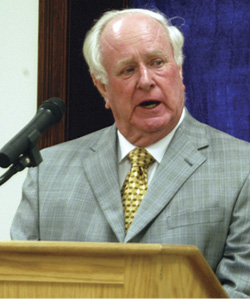Trial begins against owner of pharmacy where deadly steriods were compounded

A trial that is expected to last for up to two months is currently underway in Boston, Massachusetts, and is being closely watched and monitored by a host of Clinton County residents, including the immediate family members of the late Eddie C. Lovelace.
Lovelace, a well known Clinton County Circuit Court Judge who was considered a pillar of the community, died in September, 2012, after contracting a deadly strain of meningitis following a series of injections he had received in Nashville earlier that same year.
Barry Cadden is currently on trial in Boston after being charged with 25 acts of second degree murder.
Cadden was the co-founder of the New England Compounding Center, also known as NECC, of Boston, where the steroids that were being used to treat Lovelace and a host of other patients, were being prepared.
It was later determined that non-sterile conditions in the compounding pharmacy had resulted in those steroids being tainted and causing the patients to contract the strain of meningitis that caused serious health problems and often, as in the case of Lovelace, resulted in death.
Lovelace, who had been injured in an earlier automobile accident that had caused problems with his back, received the steroid injections at Saint Thomas Outpatient Neurosurgery Center in Nashville on July 27, August 17 and August 31.
According to reports from Boston concerning the ongoing trial, a panel of 15 jurors were selected by US District Judge Richard G. Stearns, who will be presiding over the trial.
In an article about the trial that appeared in the Boston Globe by staff writer Milton J. Valencia, three of those jurors will serve as alternates, but the identity of those alternates will not be revealed until the jury has been given the case to begin deliberations.
So far, more that 175 potential witnesses have been identified by the prosecution.
The prosecution in the case, the U.S. government, say that Cadden is responsible for as many as 25 of the deaths related to the tainted steroids.
Across the band of several states where the tainted batches of steroids were distributed and injected into patients, more than 750 became ill, with over 60 dying.
Cadden, who was also a former head pharmacist as well as co-owner of NECC, is arguing that he can not be held personally responsible for mistakes of his company.
At the time of Lovelace’s death in September, 2012, it was believed that he had suffered a stroke and died from complications related to that.
When reports of the tainted steroids began surfacing later, the Lovelace family requested that his body be exhumed and that an autopsy be performed to determine the exact cause of death.
Dr. George R. Nichols, II, then the state medical examiner for Kentucky, performed that autopsy and from his examination determined that Lovelace had in fact died as a direct result of having received injections of the tainted steroids.
Nichols said that the injections given to Lovelace at the Nashville, Tennessee clinic, contained a fungus that had set off a series of health problems that had led to his death.
“The organism was introduced by an injection of a tainted pharmaceutical substance. That’s how it all happened,” Nichols stated after completing the autopsy.
So far in testimony presented during the Boston trial, the facility has been presented as a lab that was far from having a sterile environment with a so-called “clean room” where the actual compounding of drugs took place.
Joseph Connolly, a pharmacist technician, testified in front of the federal jury, that in fact, the so-called “clean room” was infested with spiders, flies and ants.
He added that it was not uncommon for lab staffers to chase spiders with spray bottles of alcohol, spraying the spiders until they were dead.
Lovelace’s widow, Joyce Lovelace, who continues to live in Albany, traveled to Washington, D.C. in the months following her husband’s death to testify in front of a Congressional hearing that was held in November, 2012, in front of the House Subcommittee on Oversight and Investigations.



